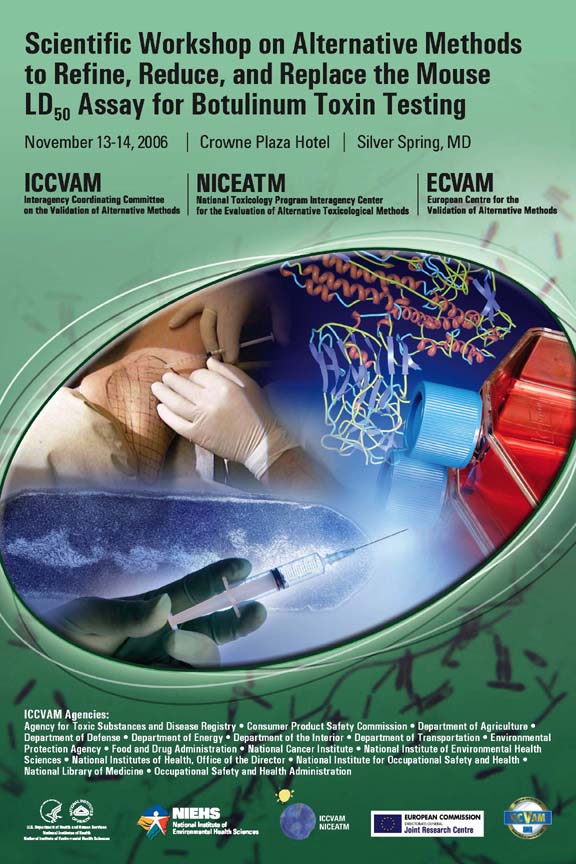Workshop Documents
ICCVAM/NICEATM/ECVAM Scientific Workshop
on Alternative Methods
to Refine, Reduce and Replace
the Mouse LD50 Assay For Botulinum Toxin Testing
Nov. 13-14, 2006 Silver Spring, MD
Workshop Report Now Available [PDF]
|
 |
Background
In response to a test method nomination from the Humane Society of the United States (HSUS), ICCVAM,
in collaboration with NICEATM and ECVAM, co-sponsored a Workshop on Alternative Methods to Refine, Reduce,
and Replace the Mouse LD50 Assay for Botulinum
Toxin Testing. The 116 attendees from 9 countries included scientists from
government and academic institutions, regulatory authorities, and the animal
protection community. The workshop goals were: (a) to review the state-of-the-science and current knowledge of
alternatives that may reduce, replace, and refine (less pain and distress) the use of mice for
botulinum toxin testing and (b) to identify priorities for research, development, and validation
efforts needed to advance the use of alternative methods (see the agenda
for additional details).
Five workshop sessions covered a variety of topics including:
- An overview of public health needs for botulinum toxin testing and regulatory requirements
- An overview of the current understanding and knowledge gaps for botulinum toxin
- A review of methods as potential replacements or refinements for the current botulinum toxin test
- A review of strategies to reduce the number of animals used for the current botulinum toxin test
During the workshop, panel discussions were held to (a) review and supplement the
background information presented during the speakers' presentations, (b) more precisely
define the state-of-the-science, knowledge gaps and identify priorities for research,
development, and validation efforts needed to advance the use of alternative methods for
each area discussed, and (c) develop specific guidance and recommendations to advance the
use of alternative methods for each area discussed.
Workshop Outcomes
In general, the consensus of the panel discussions was that the reviewed methods could be used,
in specific circumstances or in a tiered-testing strategy, to reduce and refine the use of mice in
the current botulinum toxin test method. However, none of the reviewed methods could currently be used as
a complete replacement for the botulinum toxin test method. The panel discussions noted that with
additional development and validation efforts, one or more of the reviewed methods might be useful
as a replacement for the current botulinum toxin test methods in the future. It was noted that
additional validation studies were needed for most methods (e.g., comparison of results to in vivo
outcomes, validation of methods for the specific applications). Finally, some best practices discussed
to decrease the number of animals tested for studies included (a) use of reference standards to minimize
the number of replicate animals needed, (b) use of standardized methodology, and (c) reduction in the
number of doses tested for assays where confirmation of potency is being evaluated.
Meeting Announcements:
Federal Register Notice: Scientific Workshop on
Alternative Methods To Refine, Reduce, or Replace the Mouse LD50
Assay for Botulinum Toxin Testing; Request for In Vivo and In
Vitro Data and Abstracts for Scientific Posters
(Vol. 71, No. 159, pp. 47505-6, 08/17/06)
No public comments received in response to this notice.
Federal Register Notice:
Nomination to hold a workshop; request for comments, data, and nomination of scientific experts
(Vol. 71, No. 18, pp. 4603-4, 01/27/06)
View public comments
received in response to this notice.
|
